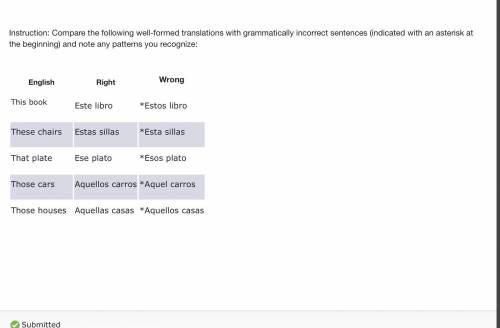
Spanish, 05.03.2021 05:30 cdyshaylia55
Now that you have worked through a lot of material that includes these basic patterns, and you have compared grammatically correct and incorrect sentences, write down what you think is a rule that could explain what makes a sentence grammatically correct or not. For example, you might write something like: "verbs always match nouns in number, and they usually come before the noun." In other words, make your best guess for the grammar rule that makes sense out of the pattern(s) you see in the phrases you have been working with. Review if you need to, and you might briefly check your hunches against the sentences you have been working with in this or previous modules. Keep in mind that what you're after is your hunch, not a grammar rule from a text book. Now check your hunch with the explanation of this principle in the following pattern.


Answers: 3


Another question on Spanish

Spanish, 24.06.2019 01:30
Which verb correctly completes the sentence? diego no seguro de que picasso sea un escultor español. a. es b. sea c. esté d. está
Answers: 2

Spanish, 24.06.2019 14:30
Ateacher talking to a student the first day of class: señora vila: sara, tú 1. la mochila y los libros en mi clase. ¿tienes el uniforme? sara: no. yo 2. el uniforme. ¿yo 3. un cuaderno, señora vila? señora vila: sí, sara, tú 4. un cuaderno y unos lápices. 1. necesito 2. necesito 3. necesitas 4. necesita 1. necesitas 2. necesito 3. necesito 4. necesitas 1. necesitas 2. necesita 3. necesita 4. necesito 1. necesita 2. necesitas 3. necesito 4. necesito
Answers: 2

Spanish, 24.06.2019 17:00
—en la mañana, ella 1. el cereal y tú 2. el jugo de naranja. —yo 3. la limonada. 1. quiero 2. quiero 3. prefiere 1. quiere 2. quieres 3. prefiero 1. quiero 2. quiere 3. prefieres 1. quiere 2. quiere 3. prefiero
Answers: 2

Spanish, 24.06.2019 22:50
Uerido diario: ayer mi hermana y yo (1) (ir) a la playa. cuando llegamos, (2) (ser) un día despejado con mucho sol, y nosotras (3) (estar) muy contentas. a las doce (4) (comer) unos sándwiches de almuerzo. los sándwiches (5) (ser) de jamón y queso. luego (6) (descansar) y entonces(7) (nadar) en el mar. mientras (8) (nadar), (9) (ver) a las personas que (10) (practicar) el esquí acuático. (11) (parecer) muy divertido, así que (12) (decidir) probarlo. mi hermana (13) (ir) primero, mientras yo la (14) (mirar). luego (15) (ser) mi turno. las dos (16) (divertirse) mucho esa tarde.
Answers: 3
You know the right answer?
Now that you have worked through a lot of material that includes these basic patterns, and you have...
Questions


Mathematics, 19.09.2019 23:30


English, 19.09.2019 23:30



Business, 19.09.2019 23:30


English, 19.09.2019 23:30




History, 19.09.2019 23:30

Mathematics, 19.09.2019 23:30



Social Studies, 19.09.2019 23:30






